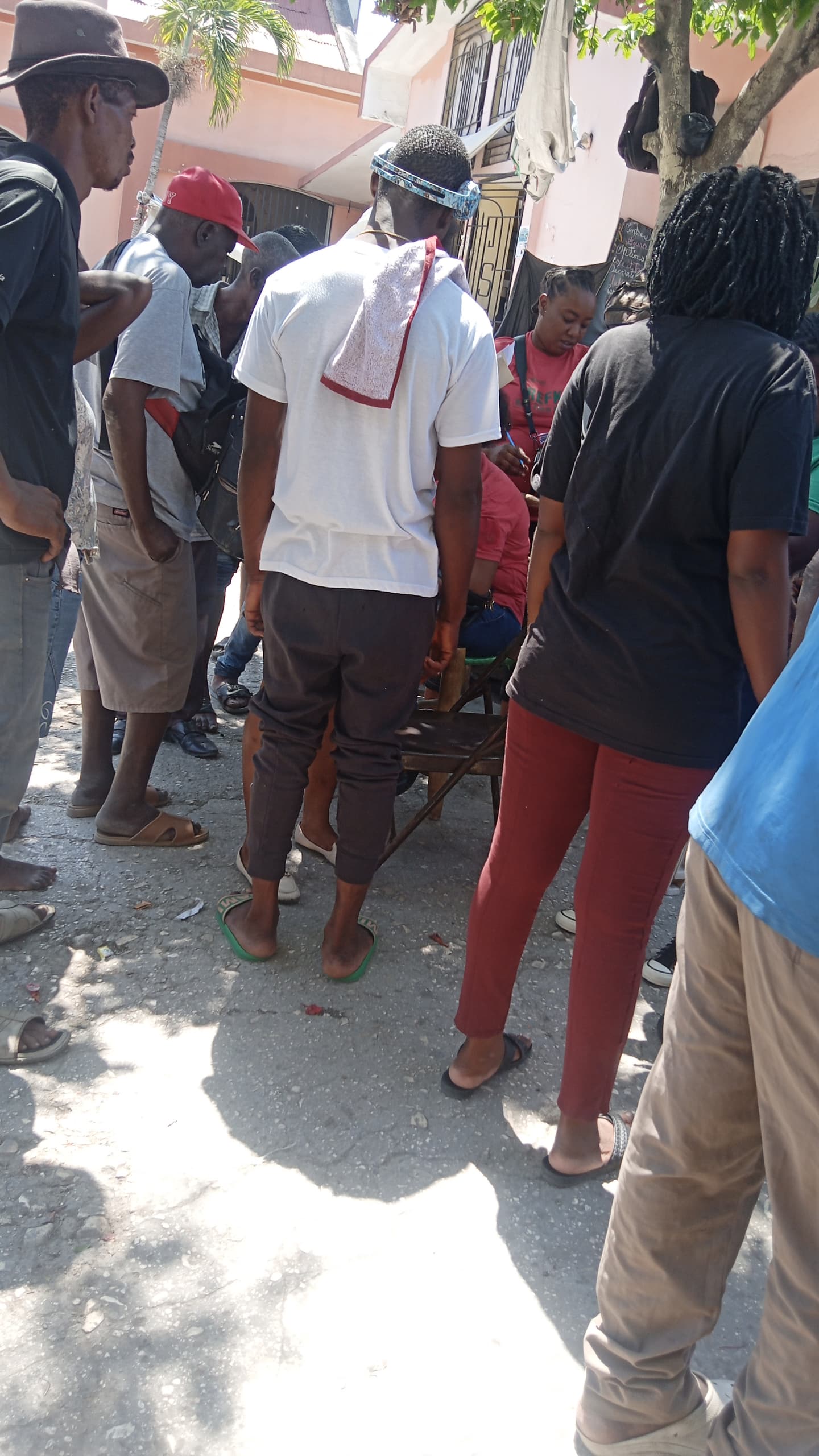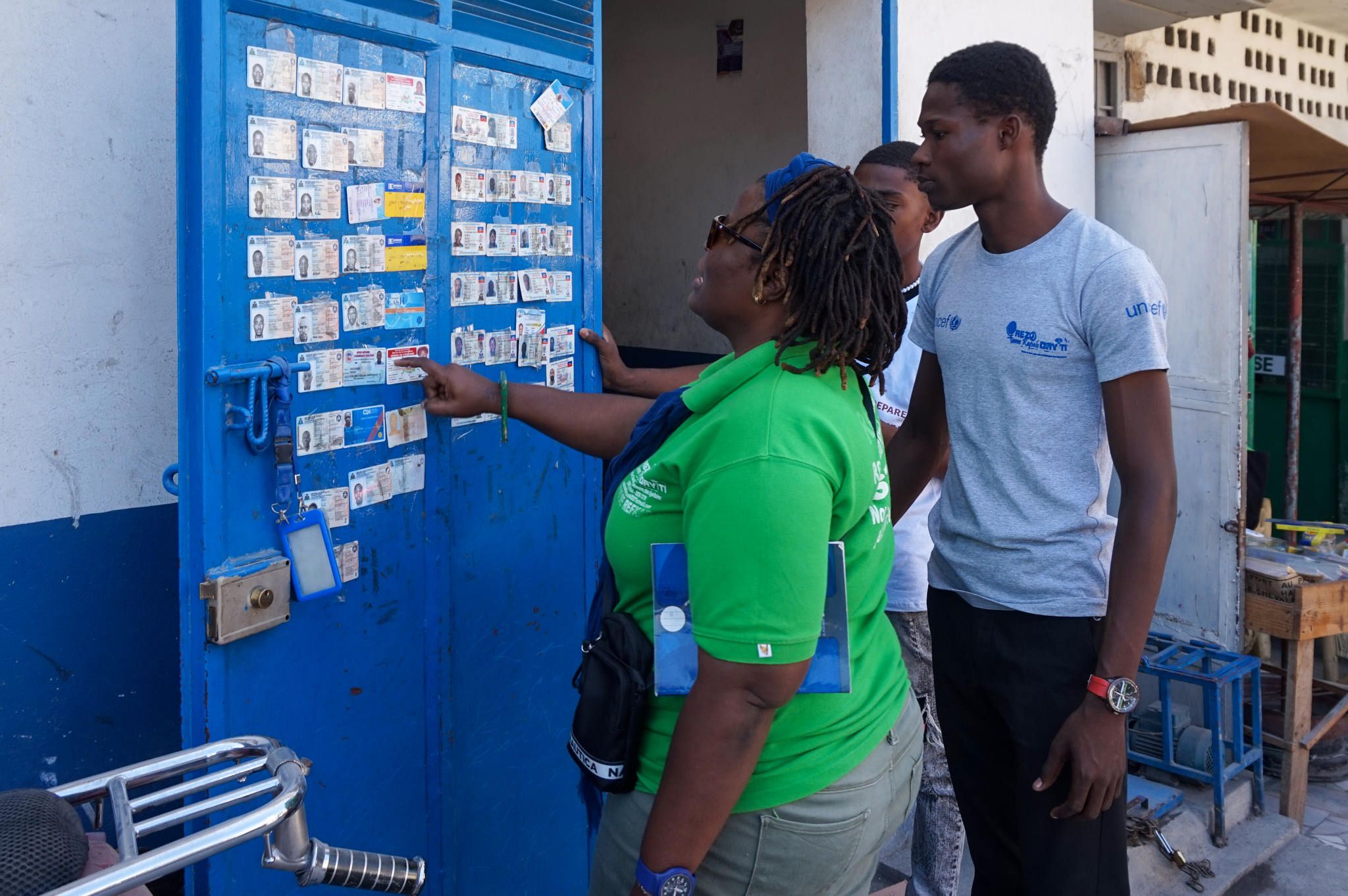The Invisible Crisis: When ID Means Life or Death
Imagine being unable to enrol your children in school, open a bank account, receive emergency aid, or prove your own citizenship. This is the daily reality for several Haitians who lack official ID documentation. It’s a humanitarian emergency hiding in plain sight—one that traditional systems have failed to address for decades.
The consequences extend beyond paperwork. Without ID, citizens are effectively invisible to the state, unable to access basic services or participate in formal economic and civic life. They exist in a precarious legal limbo, vulnerable to exploitation and unable to claim their rights.
” With my tattoos, police assume I’m a criminal. They don’t care that I lost everything—without ID, I’m automatically suspicious.”
In Port-au-Prince, Haiti, not having an ID can mean the difference between life and death. Some displaced people have risked returning to dangerous zones just to retrieve their ID documents—with reports that some never made it back. Others face discrimination based on displacement status, physical appearance, or poverty when they can’t produce official identification, effectively criminalising their existence.
Inspiration from Mexico
Our approach draws inspiration from a powerful precedent. When Mexican authorities failed to investigate thousands of disappearances, mothers formed their own community-led documentation initiatives. They meticulously mapped cases, collected evidence, and created databases that exposed the truth when official channels failed.

These mothers taught us something profound: when systems fail, data becomes resistance.
By documenting what institutions ignored, they created visibility for the invisible and accountability where none existed. They transformed personal grief into collective action through the power of systematic documentation.
Our Ground-Level Accountability System: AlerteUnité
In April 2024, we launched AlerteUnité, a community-driven emergency app designed specifically for regions like Haiti where systemic breakdowns have left people vulnerable and invisible. What began as a self-funded initiative is now evolving into a platform for accountability and action.
We are currently developing a trusted community-led system to document ID denial cases with rigour and nuance. Here’s how the system will work when fully implemented:
- Trusted Local Validators: We’re establishing a network of trained community documentors who will verify and record cases of ID denial. These validators live in the communities they serve, understanding local context while following standardised documentation protocols.
- Geographic Mapping: Our system will map cases across regions, identifying patterns and systemic failures. This geographic data will reveal where the crisis is most acute and where corruption or administrative failure might be concentrated.
- Impact Documentation: Beyond simply tracking numbers, we’ll document the human cost—how lack of ID affects education, healthcare access, economic opportunity, and safety.
- Verification Protocols: What will make our system different is our multi-layered verification process. Each case will be validated by at least two community documentors, creating a reliable dataset that can withstand scrutiny.
- Secure Database: The information will feed into a secure, centralised database that generates visualisations and reports while protecting sensitive personal data.
- Public Accountability Tool: We’re developing features within AlerteUnité to track and expose injustices in the ID system, amplifying community reports and shining light on the invisible systems that sustain corruption.

Our First Steps on the Ground
We began our journey in the communities of Delmas 30 and 32 last August, where we first tested the AlerteUnité platform. These initial sites represent communities where ID documentation challenges are particularly acute.
What’s notable is that we didn’t need to wait for extensive data to assess the urgent need. The stories we’ve heard confirm what communities have been saying for years—lack of documentation creates cascading barriers to services, opportunities, and rights.
Tragically, many of our early users have since been displaced by escalating violence. Some were forced to leave behind their most critical documents—not by choice, but by necessity. This human displacement has only deepened our commitment to addressing the ID crisis.
As we begin to systematically document these cases, we’re establishing our methodology and training our first community validators. Each interview strengthens our approach and helps refine our documentation protocols as we develop the system.
Our preliminary conversations in shelters have revealed a troubling pattern that we aim to verify through our developing accountability tool: those who already had a CIN (National Identification Card) appear to be facing significant difficulties with renewals—some waiting over a year despite urgent need.
Amplifying Voices, Not Just Collecting Data
What drives this work is not just the collection of data, but the amplification of voices that have been systematically silenced. In our initial interviews at the shelters, we’re not merely documenting statistics—we’re creating space for people to share their experiences of being rendered invisible by a system that fails to recognise their existence.
The accountability system we’re developing is designed first and foremost as a platform for these voices. Those without documentation face impossible choices: some who go through formal channels wait indefinitely, while those who “grease the right palms” might receive their documentation faster. Dignity shouldn’t have a price tag.
The trusted validators we’re training are not just data collectors—they are community advocates who understand that documentation is about restoring dignity and agency to those who have been denied both. In communities where displacement, tattoos, or poverty can become unfair markers for criminality when there is no ID to protect you, our work becomes even more critical.
The power of this approach lies in its ability to transform individual stories of struggle into collective evidence that cannot be ignored. When a person shares their experience of ID denial, that story becomes part of a larger narrative that demands systemic change.
From Promise to Reality: USAID’s Role and Our Response
In 2023, USAID launched a promising initiative to streamline ID card distribution through the deliloc system, offering hope to millions of undocumented Haitians. However, corruption and the opaque structure of Haiti’s governance have transformed this process into a transactional and dangerous ordeal.
While the National Identification Office (ONI) reports distributing millions of CIN cards, the reality on the ground tells a different story. With the current instability, people being forced from their homes, and reports of terrorists burning residences, we have no reliable channel to confirm the actual numbers.
Our quick surveys in shelters across Haiti reveal many people waiting well over a year for their documentation. These conversations suggest that official reports may not accurately reflect the lived reality—but without systematic data collection, we cannot definitively confirm or refute these claims.
This information gap is precisely why our accountability tool is so urgently needed. When authorities provide figures without transparency or verification mechanisms, only community-driven documentation can reveal the truth.
Our Vision for Growth and Accountability
Over the coming weeks, our focus will shift to accountability. We believe the USAID programme holds real potential—but without transparency, it will fail those who need it most. Our roadmap includes:
- Expanding our public accountability tool within AlerteUnité to track ID distribution issues
- Developing standardised training for more community validators
- Building partnerships with legal aid organisations
- Creating simple but robust documentation tools that work in low-resource settings
- Establishing advocacy channels to translate our data into policy change
- Exposing corruption in the current system while proposing viable alternatives
While we’re just at the beginning, the potential for impact is clear. Each documented case helps build a foundation for systemic change.

Join This Movement
If amplifying the voices of those affected by Haiti’s ID crisis resonates with you, there are meaningful ways to support this work:
- Help us connect with communities experiencing documentation challenges
- Support training programmes for community validators who can capture and amplify these stories
- Share these narratives respectfully to raise awareness
- Join our network of allies who believe in the power of community-driven accountability
What makes this initiative different is our commitment to ensuring that the voices of those affected remain at the centre. We don’t speak for communities—we create platforms for communities to speak for themselves through rigourous, trusted documentation.
When Data Becomes Resistance
In closing, I’m struck by the potential of this approach we’re developing. When systems fail and institutional accountability breaks down, communities can still create visibility and demand change—one data point, one story, one validated case at a time.
By building a trusted network for validation, we’re not just planning to collect information—we’re creating a foundation for community empowerment and systemic change. The journey is just beginning, but the path forward is clear.
As AlerteUnité reaches its one-year mark this April 2024, we invite those committed to justice, transparency, and community-driven solutions to collaborate with us as we build this critical accountability tool. This isn’t just about data—these are lives.
#AlerteUnité #CommunityData #Accountability #HumanRights #Haiti #DigitalIdentity #SocialImpact
